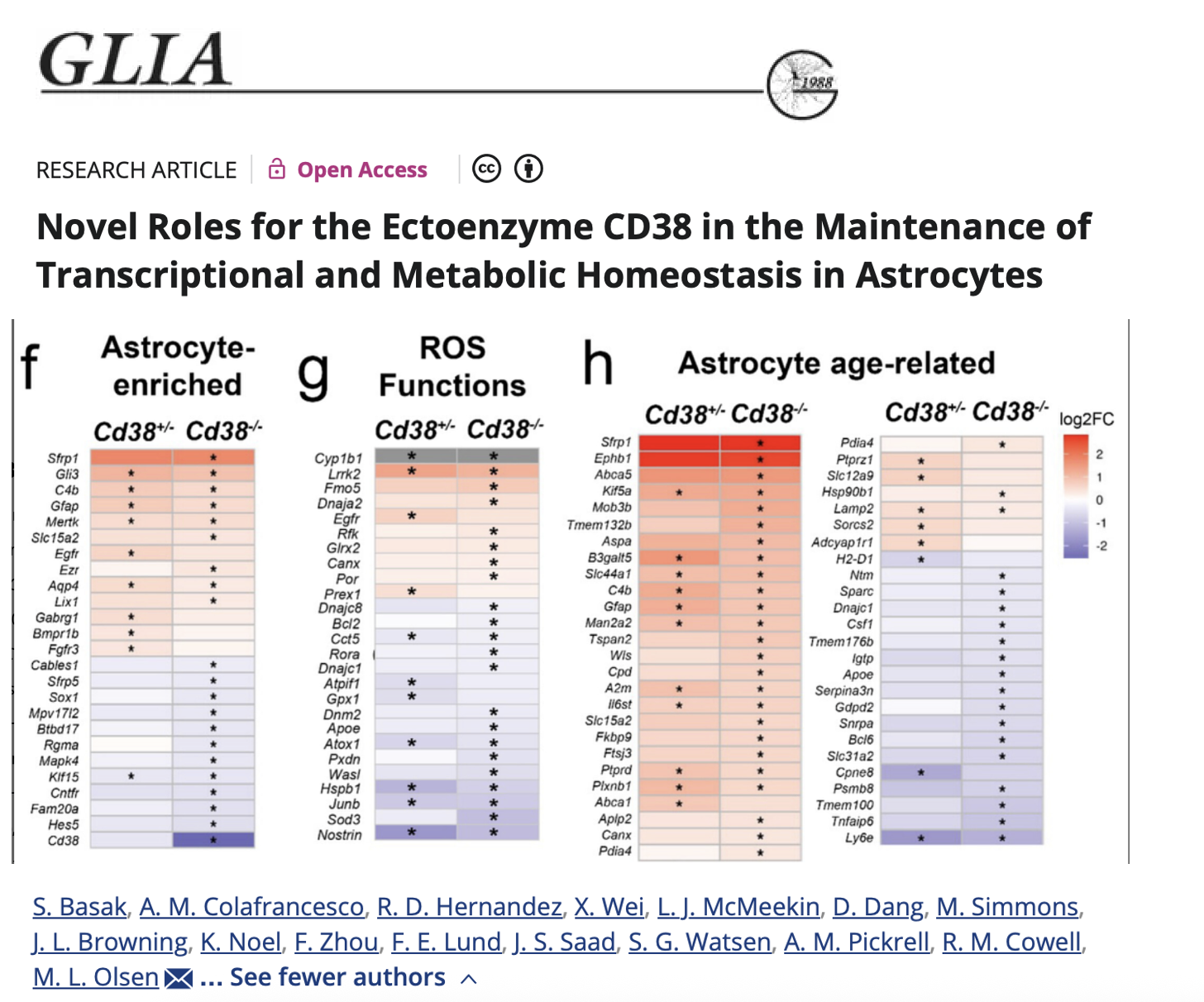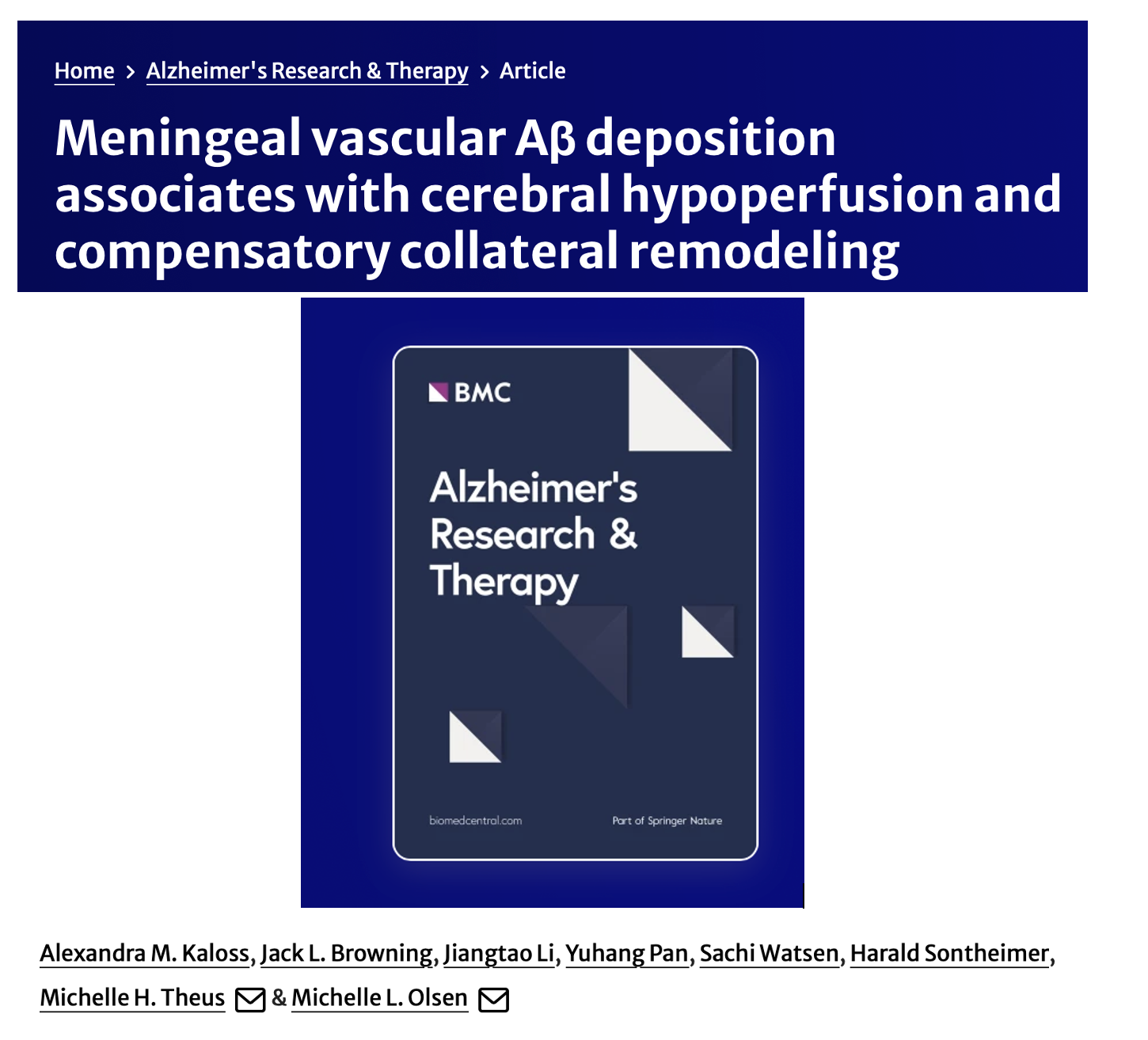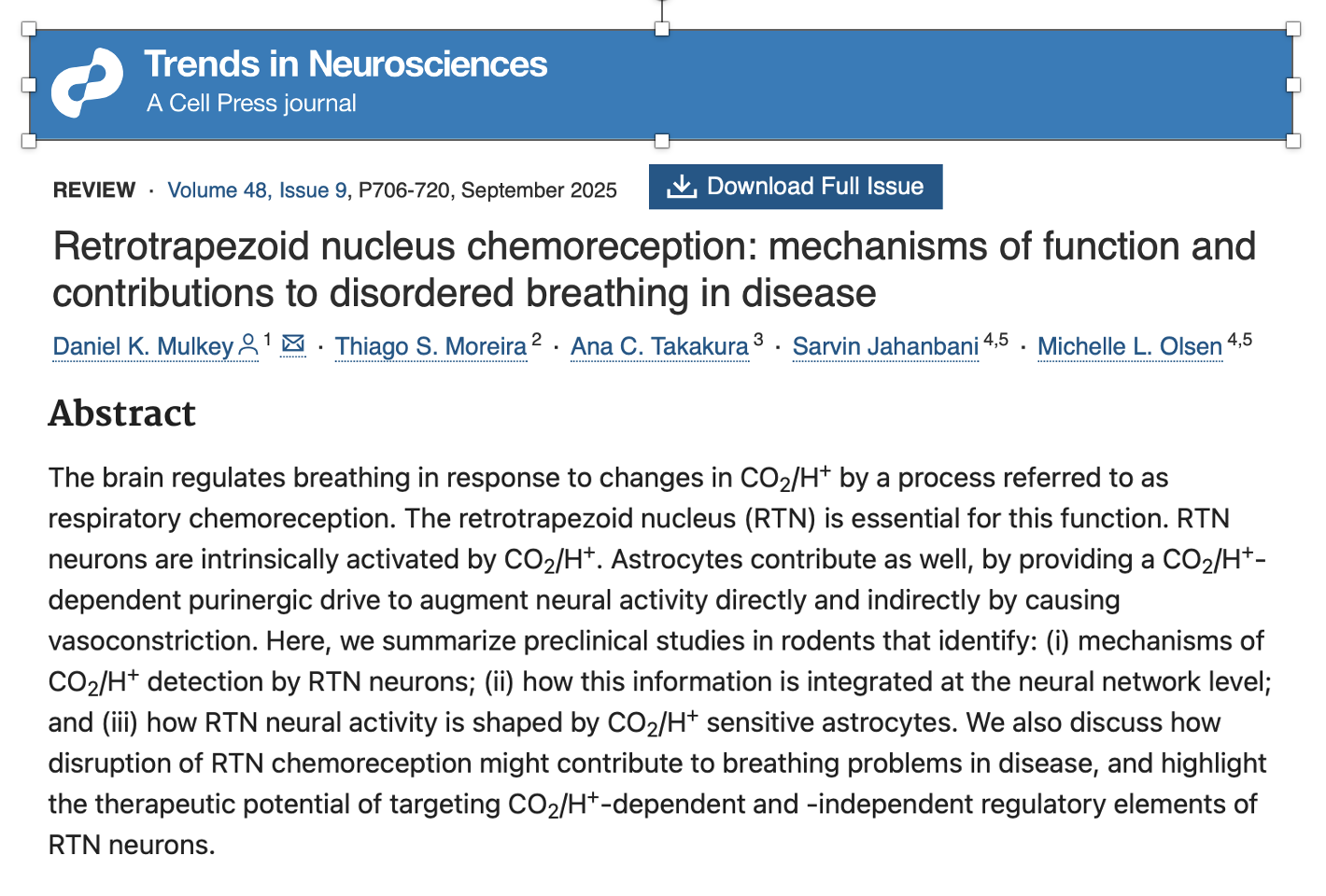
OUR RESEARCH FOCUSES ON ASTROCYTE FUNCTION IN THE CONTEXT OF HEALTH AND DISEASE ACROSS THE LIFESPAN
Olsen laboratory recent news
-
![]()
Glia 2025
In this collaboration with the Cowell lab we identify a novel role for astrocytes in the regulation of CD38-dependent NAD/NAM homeostasis in the brain and provide a framework for future studies evaluating the relationship between CD38 dysfunction, aging, and vulnerability of neuronal populations in neurodegenerative disease.
-
![]()
Have we been looking in the wrong place?
This is the first study to comprehensively characterize meningeal arterial Aβ accumulation in a preclinical model of vascular AD, mirroring recent observations in early-stage human disease.
-
![]()
2025 TINS Review on breathing in health and disease
In this review our collaboration discusses the retrotrapezoid nucleus chemoreception: mechanisms of function and contributions to disordered breathing in disease
-
![]()
2024 Jiangtao defends his dissertation!
Jiangtao will be starting his new position as a postdoctoral fellow at Columbia in the lab of Sabrina Simoes.
-
![]()
New preprint!
Conditional deletion of astrocyte TrkB.T1 disrupts astrocyte/glutamatergic synapse interactions.
-
![]()
2024 Xiaoran defends her dissertation!
Xiaoran will be starting her new position as a postdoctoral fellow with Dr. Ian Maze at the Icahn School of Medicine at Mt. Sinai.
-
![]()
-
![]()
Check out this new resource manuscript!
We have generated a new 5mC and 5hmC atlas of mouse cortex CNS cell types.
-
![]()
2024 Blast associated post-traumatic epilepsy linked to mitochondrial dysfunction
Jack works with the Vandevord and Robel labs to demonstrate post traumatic epilepsy in the context of blast brain injury is associated with mitochondria dysfunction
-
![]()
2023 Congratulations Dr. Hernandez
Does it get any better than this?
Raymundo Hernandez (F99 recipient) will be starting his new postdoc in Dr. Steven Sloan’s laboratory at Emory. Good luck Ray!
-
![]()
-
![]()
2022 Graduate Student Beatriz Torres Pinkston awarded F31
Beatriz’s work is focused on molecular mechanisms that recruit astrocytes leaflet processes to glutamatergic synapses
-
![]()
2022 Current Opinion in Neurobiology
In this minireview, we highlight recent findings that reveal the plastic nature of astrocytes in the healthy brain, particularly at the synapse, and emerging technologies that have advanced our understanding of these morphologically complex cells.
-
![]()
2022 Molecular and Cellular Proteomics
Models of Alexander disease provide insight into functions of astrocytes related to neuropathology, including a marked upregulation of FABP7 and loss of UGT8.
-
![]()
Graduate Student Ray Hernandez awarded NIH DSPAN Award
Ray was just named a 2021 DSPAN Scholar. Ray will spend the next two years (the F99 phase of his award) in the lab investigating the role BDNF-TrkB.T1 signaling in Rett syndrome astrocytes.
-
![]()
2021 Progress in Neuro-Psychopharmacology and Biological Psychiatry
The Olsen and Campbell labs collaborate.
Using an animal model of Rett, results show a correlation between gut microbial communities and phenotype
-
![]()
PhD Student Beatriz Torres Ceja Founds VT Chapter of Scientista
Did you know that according to UIS data, less than 30% of the world's researchers are women? Today, and everyday, we want to recognize women in science and other STEM related fields. To reduce the gender gap that still exists today, we need to come together and rise up.
-
![]()
2021 Glia
The Olsen and Mulkey labs collaborate.
Results identify Kir channels as potentially important regional CO2 /H+ sensors early in development, expanding our understanding of how astrocyte heterogeneity may uniquely support specific neural circuits and behaviors.
-
![]()
Congratulations to Dr. Boni!
2020- The Olsen Lab congratulates Jessica Boni on the completion of her PhD.
Dr. Boni will postdoc in the Traumatic Nerve Technologies Lab under the direction of Dr. Pamela VandeVord
-
![]()
2020 Glia
Examining whole hippocampal tissue and isolated astrocytes, in a model of epilepsy, we consistently identified hypermethylation of CpG island two, which resides in the large intronic region spanning the Kcnj10 gene.
-
![]()
2019 eLife
Using global and astrocyte specific TrkB.T1 models and astrocyte driven AAV knockout of TrkB.T1, this study demonstrates BDNF signaling though astrocyte TrkB.T1 is an important mediator of astrocyte morphological maturation.

Our research
How do astrocytes mature in the healthy brain?
How are astrocytes recruited to mature synapses?
What is the function of astrocytes at the synapse?
Are the processes above impact in disease and injury?
Our models
Healthy brain development and aging
Neurodevelopmental disorders
Parkinson disease
Alzheimer disease
Our tools and techniques
Astrocyte and neuronal electrophysiology
Confocal and time lapse imaging
Cellular and molecular biology
Epigenetics
RNA sequencing and proteomics




















